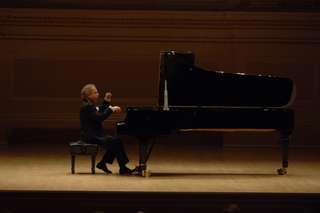|
Back
The Road to Elysium New York
Isaac Stern Auditorium
04/19/2009 -
Ludwig van Beethoven: Sonata No. 30 in E Major, Opus 109 – Sonata No. 31 in A-flat Major, Opus 110 – Sonata No. 32 in C Minor, Opus 111
András Schiff (Piano)

András Schiff (© Pete Checchia)
Without sounding flippant, Carnegie Hall should substitute their gratis Ricola cough lozenges and substitute a nightly concert of András Schiff. For almost 80 uninterrupted magical minutes, Mr. Schiff hushed up even the most fortissimo walruses. It was a perfect, heavenly silence, the only sounds coming from the Steinway Grand, and the grandeur of Mr. Schiff.
The Hungarian pianist had been criticized in his youth for sometimes being too fussy, he was given the death knell of being “a pianist’s pianist”. Possibly because his fairly late study of Ludwig van Beethoven—a composer who was never in a test-tube, who let his emotions dangle from his sleeve without any regret—Mr. Schiff has been transformed to an artist whose artistry needs no excuse.
His Beethoven cycle had to finish with those three last sonatas. And that had to be either triumph of tragedy. One can tolerate idiosyncrasies in the other sonatas, but these last three demand demonic balance. It isn’t enough to have certain “moments”. Each work is a complete structure, the most innermost searching of a man’s most profound mind, from simple beauty to Promethean tragedy and back again.
Mr. Schiff now has the life experience, and the pianistic artistry to make that trio like a foreign land which we were permitted to explore. Nothing—no intermission, no physical eccentricities, no extraneous sounds, could detract from this great concert. Beethoven once said that he had written the pieces in “a single breath”, and one felt breathless until the end.
He started with Opus 109, almost dreamily, played the march dutifully, but during the last-movement variations, Mr. Schiff took both dream and war and turned it a set of variations which took in all parts of the psyche. He has a way of taking a singe phrase and making it architectural. Or, he could take that very fast section, suddenly turning it into the soliloquy of the sixth variation, then—with poetry and transparency together—playing the penultimate section with a polyphonic masterpiece. The finale, as played by Schiff, was thunderous enough, the trills above the syncopated themes. But then, Beethoven knew that the most agonizing storms, whether in the Pastoral Symphony or this un-titled Sonata, can end, bringing back to the simple beginning.
Mr. Schiff accepted the applause, sat and played the opening of Opus 110 with the same dreamy nonchalance as the previous work. Again, that opening was deceiving. The arpeggios were not simply dazzling, they spun the web for another innocent moment until the hands went to the extremes of the keyboard, starting again this psychological probe. Mr. Schiff’s handling of the fugues was reverential, but as he made the change to the last gradual speeding up, it was done with such quiet evenness that one hardly noticed the velocity. It was the shaping of a sculptor, not a piano-player.
Opus 111 could have been Beethoven’s death and transfiguration—except for the idolatry of comparing the piece to the all too conscious Strauss tone-poem. The opening “struggle” was drawn forth with that same intensity to make every note count. The finale, though, exceeded any expectations. Once again, we were in a simple dream world, which turned into contemplation, memory (that glorious return to the first-movement theme) and finally under Mr. Schiff’s hands, yes, the entrance, not into Valhalla but into Elysium. Never once, not even during the 32nd-note triplets, did Mr. Schiff feel any need to show off. They were evenly-paced, they sung, and they finished with a final Amen.
After that, I made my own prayer that he would not play a single encore, and my prayers were answered. Mr. Schiff, like Beethoven, had played that “single breath”. Anything else, like the missing coughers, would have broken the spell.
Harry Rolnick
|